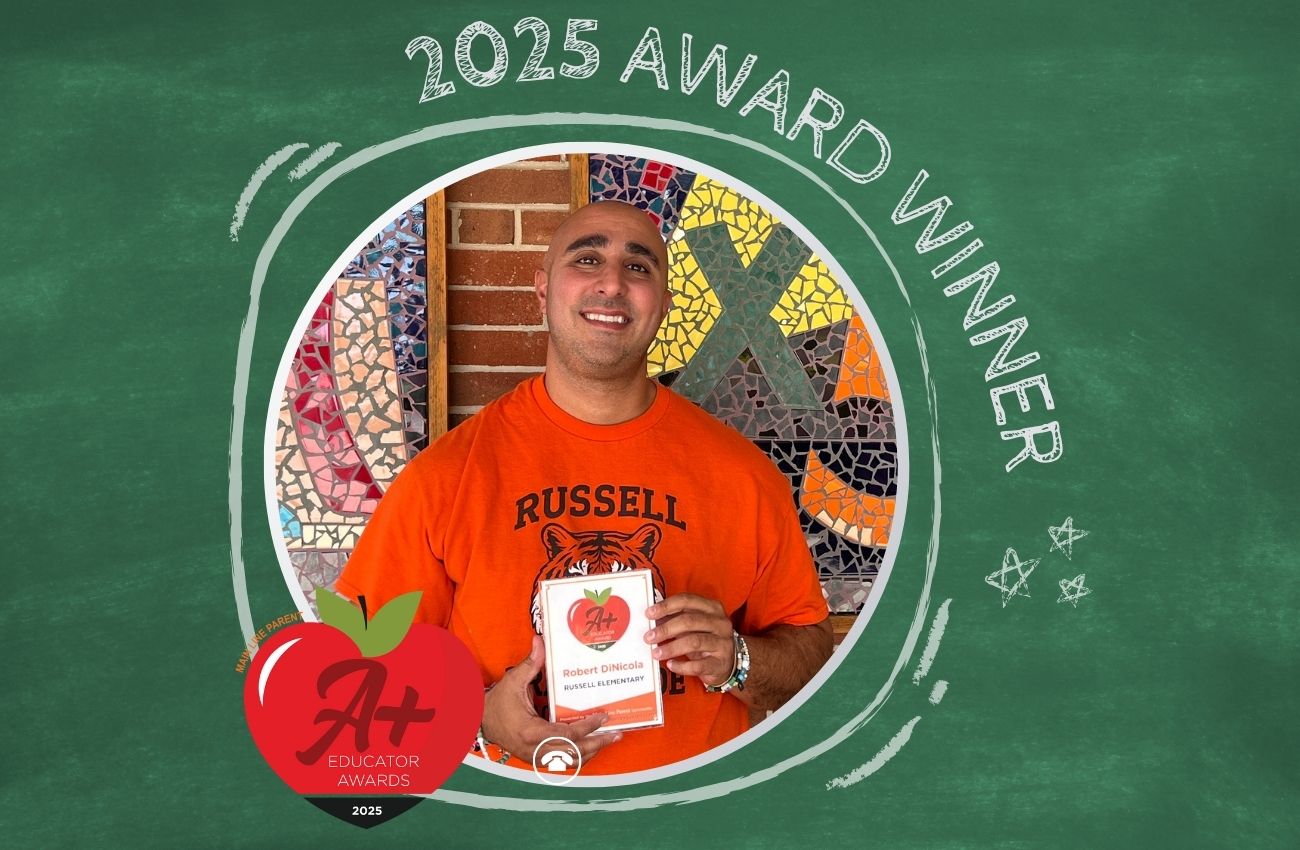 His Nominators Say:
His Nominators Say:
“Mr. Langin is my son’s seventh grade Language Arts teacher at Haverford District Middle School. Mr. Langin’s class is not easy–he pushes his students to be deep, critical thinkers. But he does it in ways that engage and draw out his students. He openly states that he does not assign “book reports,” but instead has students share their ideas in ways that are relevant to them, and that help them make deep and thoughtful connections with literature, the arts, and themselves. Mr. Langin does lots of subtle, but important things for his students. He lifts them up. You may think, based on this report, that my son was an “A” student in Language Arts. He was not. He has ADHD and struggles with executive functioning. He often forgot to complete or turn in homework, and struggles to maintain a B average in Language Arts. Often his grade would dip to a C or D. And yet, at the end of the year, he said ‘Mr. Langin is a great teacher. He is tough, but I really love his class, and I learn so much.’” –Main Line Parent Community member
Get To Know Jason
What made you want to be a teacher/educator? When did you decide that was your path?
My road to teaching was not the most direct. I worked for eight years in business and was extremely unhappy. My last job, however, had me working with educators. I worked for a cyber school developing curriculum for students around the world to use and enjoy. Unfortunately, the online marketplace is volatile, and once the company lost money I was let go. My wife was six months pregnant, it was two weeks before Christmas, and I was out of a job. My wife told me that since I had spent so much time making materials for teachers to use that I should just be the teacher. Most of my smart decisions in life involve listening to my wife, so I did. I obtained my teaching certification while taking care of my infant daughter. I am indebted to my school for taking a chance on a 28-year-old teaching rookie 16 years ago. It was one of the best decisions of my life.
What is your teaching philosophy?
The material that you teach is always secondary to the people in the room. You have to teach kids first and foremost. For instance, I teach seventh graders, and my method for doing it is my subject matter – language arts. I also believe that students need to know why they need to learn anything. It isn’t enough to tell students, “You’ll need this when you get to the ‘real world.'” There needs to be a value to the information or skill today. If you, as a teacher, do not see the greater value in what you’re doing, is it really worth teaching? You have to believe in it wholeheartedly.
How do you make your classroom/teaching environment feel welcoming and dynamic?
The classroom is a stage, and it’s got to be the best show in town. Look at all the things we are competing against for student attention. Can you really blame a student for selecting Fortnite and YouTube over Shakespeare and dependent clauses? I was a theater minor at Villanova (Go Cats!), so I always try to keep in mind what it takes to keep a student’s attention. Sometimes you have to be stupid and make the kids laugh. Other times you have to lock into a serious conversation. It’s also important to greet everyone and say their names in class. We all need to be recognized, and those are the little things I try to do to make the students realize I notice them every day.
What would you love for the parents of your kids to know?
One is that I don’t drink coffee, so please send your mugs and Starbucks gift cards elsewhere. Seriously, though, I just want parents to know that I look at my room as an extension of my home. I want the students to feel like they belong. I know I’m not always going to be successful at that goal, but I will always do my best.
How do you encourage reluctant learners?
I think we’re all reluctant learners – especially if it’s about something we don’t care about. The trick is to make that personal connection with the material we present. If you help the students see what those connections are, it will make it much easier for them to want to learn. Motivation is everything.
How do you resolve problems in the classroom, if a student is disruptive, for example, or if two students aren’t getting along?
Whenever possible, I try to talk it out and handle it on my own. I am a very approachable person, but I can turn on the “tough” when I need to. I think middle schoolers need to be spoken to with respect. If you baby them, they will turn on you. Speak to kids straight but always in private. I’ve definitely said some things I regretted to students, but I have tried to own those mistakes too by apologizing. Working with other people is an essential component to learning and life. It’s our job as teachers to give students opportunities to interact with peers with guidance and modeling.
How can you tell when your material is connecting with your students? How do you measure progress?
All eyes are on you. Heads are nodding. It’s one of the best feelings in the world. It doesn’t happen every day, but it’s very rewarding when it does. You can always see academic progress with tests and essays, but true progression is recognized from within. I have the students reflect in June on their progression. When they are able to recognize progress, that matters more than anything. No test score will be able to do that.
Has teaching changed since you started?
Trends come and go, but a great teacher is a great teacher. I’m fortunate to know and work with many.
How do you prepare for the first day of school/class?
I spend the whole night awake thinking. Despite all these years, I still get nervous. The first day sets the tone. Your daily mood is going to be so swayed by the way your school day goes. I am not a person who can “leave it at the office.” School is on my mind constantly. I also try to keep in mind that my students are equally nervous, and I want to be sure they want to come back on day two! If they do, that’s a win!
What has been the most rewarding thing about teaching?
It’s what comes after that is the best reward. Unlike certain jobs like a carpenter or a baker, we may not always see the end result of our work. Sometimes it is years later before you realize the impact your work has. I have had students come back to sit in my class as grad students to become teachers or others contacting me years later that I encouraged them to enter a certain profession or field of study. For some kids, it’s just seeing them finish high school that is the reward. All teachers have a hand in each student’s success. I’d like to think that for some students, however, my input was special. I want students to go on to live happy, productive, empathetic, and charitable lives. That’s what drives me more than anything. I have been very blessed in this profession to have interacted with so many great students, parents, and colleagues as well as an amazing family that is so supportive of my endeavors.
Know a Great Teacher? Nominate Them for a Main Line Parent A+ Educator Award!





